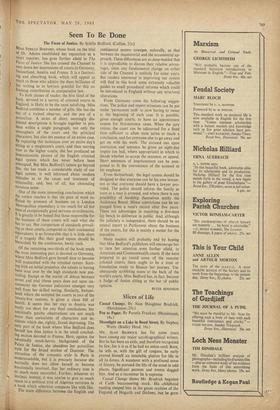Seen To Be Done
The Faces of Justice. By Sybille Bedford. (Collins, 21s.) MISS SYBILLE BEDFORD, whose book on the trial Of Dr. Adams established her reputation as a court reporter, has gone further afield in The Faces of Justice. She has crossed the Channel to note down her impressions of courts in Germany, Switzerland, Austria and France. It is a fascinat- ing and absorbing book, which will appeal as much to those who admire the sheer brilliance of her writing as to lawyers grateful for this re- freshing contribution to comparative law.
To both classes of reader, the first third of the book, devoted to a survey of criminal courts in England, is likely to be the most satisfying. Miss Bedford combines a number of gifts. She has the eye of a trained observer, and the pen of a 120intilliste. A series of short, seemingly dis- jointed descriptions is brought together to pro- duce within a single paragraph, not only the atmosphere of the court and the principal characters, but also the essence of an entire case. BY repeating this technique over an entire day's Bitting at a magistrate's court, and then moving over to the higher courts, she. has produced an impressionistic picture of the English criminal legal system which has never before been attempted. But Miss Bedford's talents go beyond this; she has made a considerable study of our legal system, is well informed about modern attitudes as to the cause and treatment of criminality, and, best of all, has abounding common sense.
One of the more interesting conclusions which the author reaches is that the pace of work in- flicted by pressure of business on a London Metropolitan stipendiary is too much for all but men of exceptionally good nervous co-ordination. It is greatly to be hoped that those responsible for the business of these courts will read what she has to say. Her comparison of standards prevail- ing at these courts, compared to their continental equivalents, is so favourable that it is little short of a tragedy that their good repute should be blemished by the continuous, hectic rush.
Of the remaining two-thirds of the book much the most interesting part is devoted to Germany, where Miss Bedford gave herself time to become well acquainted with the criminal system. Start- ing with an initial prejudice, she admits to having been won over by the high standards now pre-
vatlin-g.
Except in the matter of delays between
arrest and trial (three years does not seem un- common) the German judicature emerges very well from her skilled testing. Similarly, Switzer- land, where she sampled the courts in two of the twenty-five cantons, is given a clean bill of health. It seems that her stay in Austria was really too short for any final conclusions; her admittedly patchy observations are not much more than caricatures of characters and in- cidents which she, rightly, found depressing. The only part of the book where Miss Bedford does herself less than justice is in the small conclud- ing section devoted to France. Here, against the admittedly mock-heroic background of the Palais de Justice, she abandons her pointilliste style for the broad strokes of Daumier. The attraction of the romantic style in Paris is Understandable, but it is precisely because she normally does not allow herself to become emotionally involved, that her ordinary tone is so much more successful. Further, whatever its intrinsic interest, it was unwise to give so much space to a political trial of Algerian terrorists in a book which otherwise compares like with like.
The main difference between the English and continental system emerges, naturally, as that between the inquisitorial and the accusatorial ap- proach. These differences are so deep-bedded that it is unprofitable to discuss their relative advan- tages, since any fundamental change on either side of the Channel is unlikely for some years. But readers interested in improving our system will find in this book some extremely valuable guides to small procedural reforms which could be introduced in England without any structural alterations.
From Germany come the following sugges- tions. The police and expert witnesses can be put under 'permanent oath' to ,save having to swear at the beginning of each case. It is possible, given enough courts, to have an appointment system for first-instance cases. When the jury retires, the court can be adjourned for a fixed time sufficient to allow most juries to reach a conclusion, and for everyone else to go away and get on with his work. The accused can upon conviction and sentence be given an eight-day respite (on bail, where appropriate) in which to decide whether to accept the sentence, or appeal. Short sentences of imprisonment can be post- poned to fit the convenience of the accused or his employer.
From Switzerland : the legal system should be designed so that everyone can be his own lawyer, not so that everyone should have a lawyer pro- vided. The police should inform the family as soon as a man is arrested, and where there is any possibility of hardship themselves notify the Assistance Board. Minor convictions can be ex- punged from a man's record after five years. There are advantages in requiring a five-man lay bench to deliberate in public. And, although the judiciary is independent, there should be an annual report to Parliament about the business of the courts, for this is mainly a matter for the executive.
Many readers will probably end by hoping that Miss Bedford's publishers will encourage her to turn her attention even further afield, to American and Commonwealth courts. If she were prepared to go round some of the remoter colonial courts, there ought to be a trust or foundation ready to finance her journey. Un- obtrusively scribbling notes at the back of the world's courts, Miss Bedford has, in fact, become a Judge of Assize sitting at the bar of public














































 Previous page
Previous page